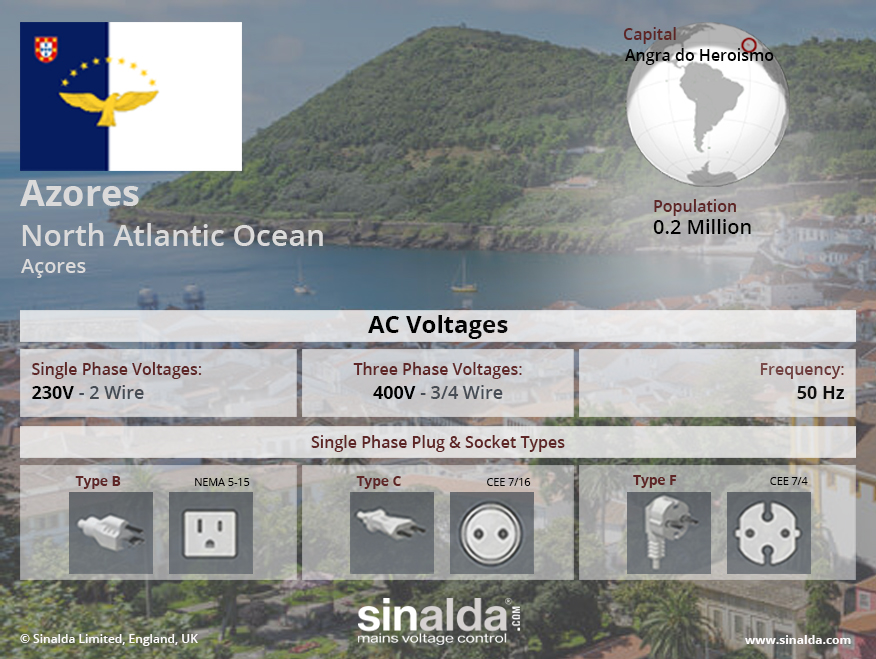Last Updated: 01 November 2021

Copyright 2021 Sinalda. Permission to use this image is granted subject to appropriate credit being given to www.sinalda.com as the source.
Power Quality in Azores
The Azores, an autonomous region of Portugal, is an archipelago located in the mid-Atlantic. Composed of nine volcanic islands, the Azores are well-known for their stunning landscapes, rich biodiversity, and unique energy infrastructure. The reliability of the electricity supply in the Azores is generally high.
Power Sector in Azores
Given the archipelago’s geographical characteristics and isolation from mainland Portugal, the Azores have prioritized the development of a decentralized energy system. Each of the nine islands has its own independent electricity network, primarily powered by local renewable resources. This approach helps to increase the resilience of the Azores’ power supply and reduce reliance on imported fossil fuels.
The Azores’ energy mix is diverse, heavily emphasising renewable energy sources. The islands use their abundant geothermal resources, particularly on the islands of São Miguel and Terceira, which are home to geothermal power plants. Additionally, wind and hydroelectric power are harnessed across the islands. Diesel generators fulfil the remaining power demand.
Capitalising on their local renewable energy resources, the Azores currently generate about 40% of their electricity from renewables, 60% of which comes from geothermal energy (the remainder is provided mainly through wind and hydroelectric power). 60% of the Azores’ energy is imported from the mainland in the form of fossil fuels.
Power Reliability in the Azores
The reliability of the electricity supply in the Azores is generally high. The diversification of energy sources and the decentralization of the power system contribute to a robust and resilient electricity network. Each island’s ability to generate its own electricity reduces the risk of widespread power outages.
However, the reliance on renewable energy sources, particularly wind and hydroelectric power, can lead to fluctuations in power supply due to weather conditions. The Azores have implemented energy storage systems to mitigate this issue and maintain diesel generators as a backup.
Future Prospects
The Azores aim to become a global leader in renewable energy and sustainability. The regional government has set ambitious goals, including reaching carbon neutrality by 2050. To achieve this, efforts are being made to further expand and diversify the islands’ renewable energy portfolio. Plans include increasing the capacity of geothermal and wind power generation, exploring solar power potential, and investing in energy storage and grid optimization technologies.
Moreover, research is ongoing in the field of ocean energy, with the Azores being a potential site for wave and tidal energy generation, further diversifying the energy mix and enhancing the reliability of the power supply.
Conclusion
In conclusion, the Azores present a unique case study of a decentralized, renewable-focused energy system. The islands’ commitment to sustainability and energy independence has resulted in a reliable electricity network capable of overcoming the challenges posed by their geographical location. The future of the Azores’ energy sector looks promising, with continued innovation and investment poised further to improve the reliability and sustainability of the power supply.
Share your Views and Experiences
Every reasonable effort is made to ensure that the information provided above is accurate. No guarantees for the accuracy of the information is made.
So we are able to keep the content updated, and actual on the ground experiences can be shared with others, please feel free to contact us.







